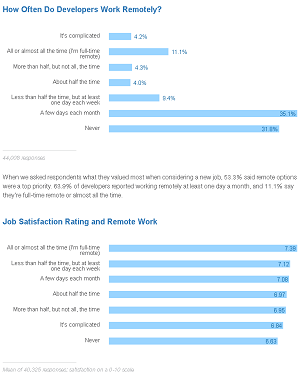News
Open or Private Offices for Developers? Stack Overflow Says 'Go Remote'
- By David Ramel
- April 17, 2017
While the debate continues about whether enterprises should offer their developers private offices or open workspaces, coding site Stack Overflow espouses a third option: go remote.
Stack Overflow long ago expressed its preference for placing its developers in private offices rather than open environments, such as cubicle farms or rows of workstations, but acknowledged that increased cost is the primary barrier to that approach.
According to one Stack Overflow staffer, the simple answer to providing more quiet surroundings and productive workspaces for cost-conscious companies is to just let developers work from home.
"Think about it: remote work brings with it all the benefits of a private office," Stack Overflow's Alyssa Mazzina said in a blog post last week. "You control your environment, your schedule, your everything. It can be quiet when you need quiet, or as loud as you want to make it when you want music."
And, she continued, remote working can be a win-win scenario. "A home office isn't just better for developers, and for your company, because it improves focus, increases productivity, and supports a healthy work/life balance," she said. "A home office is also cheap."
Mazzina cited a comparison conducted by exec Alex Miller that indicated an office-based Stack Overflow employee in New York annually costs the company $10,000 for office and furnishings and $5,000 for on-site perks, while remote employees costs only about $1,000 annually in furnishings and $500 in perks.
"If employees are in an office, you have to not only pay for space for them now, but you have to build out and warehouse space in advance," Mazzina quoted Miller as saying. "You're paying for empty seats. But with remote developers, you only add what you need as you need it."
 [Click on image for larger view.]
Remote Work in the Stack Overflow Developer Survey (source: Stack Overflow)
[Click on image for larger view.]
Remote Work in the Stack Overflow Developer Survey (source: Stack Overflow)
While Mazzina didn't mention it, Stack Overflow's recent survey of more than 64,000 developers showed that work-from-home options were valued by coders.
"When we asked respondents what they valued most when considering a new job, 53.3 percent said remote options were a top priority," the survey said. "A majority of developers, 63.9 percent, reported working remotely at least one day a month, and 11.1 percent say they're full-time remote or almost all the time."
Furthermore, the survey said: "There is a moderate correlation between remote work and job satisfaction. The highest job satisfaction ratings come from developers who work remote full time."
Other survey statistics indicated that graphic designers were most likely to work remotely (22.3 percent of respondents), with desktop developers at the other end of the spectrum (10.9 percent).
In assessing potential job opportunities, respondents graded "the opportunity to work from home remotely" at 3.43 on a 1-5 scale where 1 equals "not at all important" and 5 means "very important." The No. 1 response to that question was "opportunities for professional development" (4.23).
However, the largest plurality of developers (35.1 percent), said they only work from home a few days per month, while 31.8 percent said they never work remotely. As stated, on this question, only 11.1 percent said they work remotely almost all of the time.
According to the survey, the Russian Federation leads countries with respect to the percentage of developers who work remotely (22.8 percent), with the United States coming in at No. 4 at 12.8 percent, behind Brazil and Italy.
Mazzina hopes those percentages will rise.
"If you're a developer fed up with open office plans and want the freedom to work from your home, head over to Stack Overflow Jobs and look for the 'remote' tag," she said. "There are lots to choose from!"
As some commentators to the post pointed out, however, there are some issues to work out for companies going remote.
"For a job to open the doors to remote work they first must have a guideline and metrics on the work produced," a reader said. "As psychology pointed out, people will work harder if they feel they are being watched and in a home environment they are free to do as they wish. You must have trust in your employee to do their work with high production, and that's a tough metric to have."
About the Author
David Ramel is an editor and writer at Converge 360.